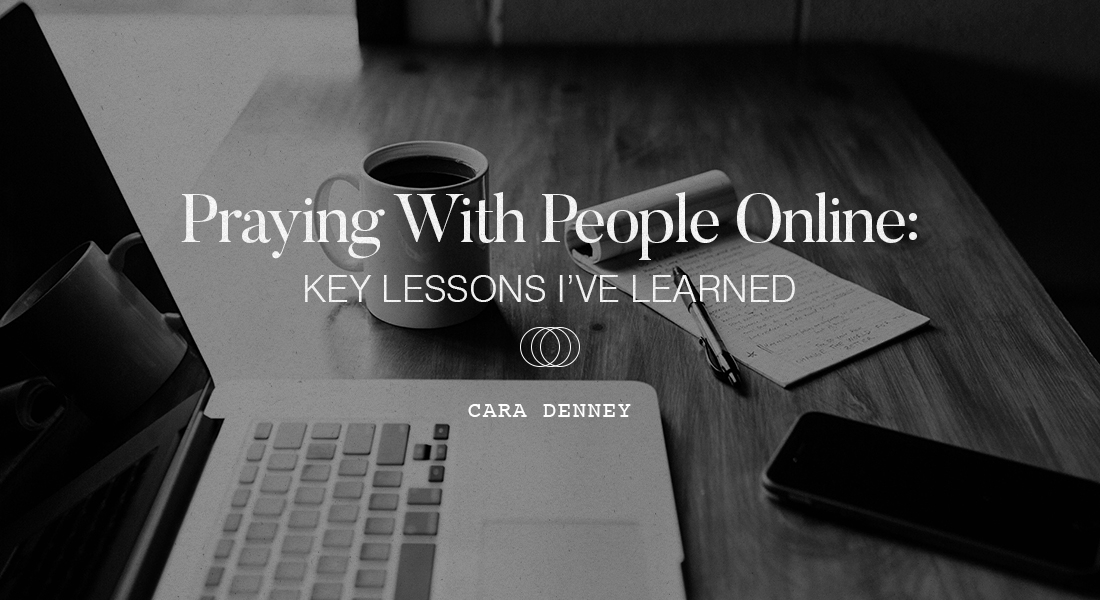
Every day for the past year (since March of 2020) I have thought about what is meant when we say a “healthy church” while leading a prayer hour with Calvary Global Network’s “Prayer Around the World” initiative. I’ve become more convinced than ever that the Church throughout the world is in no way what most would call “smooth operating.” But, oh, how blessed I have been to also experience first-hand that the worldwide body of Christ is definitely alive, active and growing despite illnesses, attacks and failures.
The CGN “Prayer Around the World” initiative is men and women – pastors, missionaries and other church leaders – leading an hour of prayer on Facebook Live, Monday – Friday, praying for people who log on with their prayer needs from anywhere in the world. You can click here to join a prayer hour live or to watch the archives.
Some of the things that have I learned about prayer through CGN’s Prayer Around the World are:
ONLINE PRAYER IS WEIRD
It is. But I regularly remind people logging on my prayer hour that although this type of prayer is unusual, public prayer is just one of the many different ways prayer is shown in the Bible. We are encouraged to pray privately (Matthew 6:6), to pray with one another (Matthew 18:19-20), and there are also positive examples of public prayer. The prophet Ezra, King Solomon and even Jesus cried out to God in public. Once, even God’s response to Jesus’s prayer was said to be not for him, but for the benefit of those listening (John 12:28,30).
Prayer, in any form, in its essence should be honest (Psalm 145:18), passionate (James 5:16) and intimate (Psalm 66:18). But how can that be achieved for an hour at a time, while you’re not truly “alone,” but where the only interaction with others is is not in person, not even voices or video faces online but only through text? For me, only by humbling leaning into all that I do not know, endeavoring to “be not wise in my own eyes” (Proverbs 3:5-6) and becoming a student of prayer has God been able to work.
PRAYER IS A MYSTERY
While I have learned some things about prayer after half a century of praying, hearing countless teachings on prayer and teaching some of those myself, I still don’t understand how prayer works. In these online prayer hours, it’s what I don’t know about prayer that has become most vital for me to remember. Again and again, I am reminded of Jesus’ call for all those who are weary and burdened to come and “learn of Him” (Matthew 11:28-30).
When I was asked at the start of the quarantine around the world to pray that the pandemic would end, this was something that I did easily and with fervor! However, after weeks and weeks and weeks of praying for the virus to end and things appearing to get worse – more people sick and dying along with conflict about where the virus came from, how we should respond, etc. – we were all reminded that to simply ask for escape from this trial was not enough. God, as always, has a bigger plan and has much He wants to teach us about prayer.
What is God trying to say through all this? What should our attitude be, and how does He want us to respond? Where can we still find a heart of worship in this strange year, even as the disciples did while imprisoned and in chains? These are the things that began very early during the weeks of prayer to resonate in my heart and mind. And yet, understandably, people were still coming online asking me to “pray for the pandemic to end” or for “success for their political candidate.”
So how do you – day after day for weeks on end – comfort complete strangers, not turn prayer into veiled lectures and yet still be mindful that you are praying to a great and awesome God whose ways are far above yours? Awkwardly, at least for me. And only by leaning into your great lack of understanding compared to God’s omnipotence and echoing the cries of the disciples for Him to “teach us to pray” (Luke 11:1).
And as He’s been teaching, I have been reminded that (as with any conversation), I can always stop, ask forgiveness for only talking and not listening, and wait to hear what the other is saying before moving forward. Awkward, but amazing.
PRAYER IS WORK
We come to prayer to get answers, to find healing, to be refreshed – and we are! And yet to really intercede is to labor in prayer. Prayer is often very exhausting, especially in this unnatural online forum. To focus personally on each person’s needs, even though you can’t see them, hear them, don’t know them, etc. its not anything that the disciples or the early Church fathers could have imagined; nor anything that Scripture speaks about specifically.
But I don’t want to be exhausted at the end of prayer time because I have tried, in my own strength, to stir up something emotionally or create an atmosphere that would maybe comfort superficially, but lack the power of God. Many times I simply stop praying, realizing that I am caught up in my empathy for someone’s pain but maybe have crossed the line into human emotion that, while not intrinsically bad, is not the aim of prayer. To be mindful of the holy, almighty God to whom we are praying, and to His power and presence alone, that can answer prayer and meet needs – this is our desire. To stay aware of this takes effort, and I have found myself humbled at times as I’ve realized I am preaching, teaching or even sympathizing, but not truly mindful of coming before a living God.
PRAYER IS GOD’S WORK
So prayer is not about me, nor ultimately is it even about the people and their needs that are asking for prayer. Prayer is about God and His place and purpose in the things that drive us to prayer, both good and bad.
One example God regularly reminds me of is the story of Jesus’ first miracle of turning the water into wine at the wedding of Cana (John 2:1-10). The need was for wine. It would’ve been natural for the servants to run around looking for wine or for money to buy wine, but instead, they were told to just wait on Jesus’ instructions. And once he spoke, they weren’t told to do anything unique, outstanding or even different than the job they most likely often did – simply fill up water jugs.
We don’t know when the water actually turned to wine. It would’ve been great if as they poured the water into the jugs it turned into wine right then. They would have had confidence carrying it to the Master of the Feast to taste. It may have, but the text doesn’t say that. How anxious the servants might have been if the wine still hadn’t appeared as they poured that first goblet. Even worse if, as the Master of the Feast began to bring it to his lips, it still remained water! But, truly, when it became sweet wine before it touched his tongue, all was well. And that was something they had no control over. They simply needed to obey and trust Jesus. That’s how it is on these prayer times.
There are those who have been coming nearly every day since these prayer times started back in March with the same prayer requests, and so far, God has not answered those prayers. It is sometimes so sad. Together we pour out and pour out the water of our prayers, and yet they have not been able to drink of God’s sweet wine in these specific areas of their lives. As we pray, I do see hearts meet with God as they are encouraged and strengthened to face the battle one more day. I have been reminded that it is not for the servant to determine when the Master will do His transforming work and turn the water to wine. My place is to simply keep doing as Jesus instructs, pouring out what I have been given to all who are seated before me.
PRAYER IS HUMBLING
In all this, I am greatly encouraged that Jesus described himself as meek and lowly (Matthew 11:29), and that it is in this reality of his nature where he said, “you will find rest for your souls.” Not in His might or power, but in His humility.
Like many of the others leading prayer times with Prayer Around the World, life often interrupts our schedules, and sometimes I’ve had to try and pray while walking, or in a car, from parks and overall from less than ideal circumstances. (Once my dog decided to throw up so loudly during prayer time that the people watching online could hear it. Fun times.) This reminds me that I don’t need to think that only polished and professional looking or sounding prayers reach the throne of God.
Or other times I’ve had a conflict with someone; I’ve been a less than stellar example of God’s love and grace, (in other words, I’ve been human), and then it’s time to go online for prayer and go before the presence of God on behalf of waiting people. (This has given me great compassion for my brothers and sisters who regularly minister on a more public and visible stage than most.) At these times, I have come online and repented, hopefully modeling to those praying with me that we are to “confess our sins to one another, and pray for one another, that we might be healed” (James 5:16). This has led to others confessing their sins and repenting online as well. It has not always been comfortable when this has happened, once or twice it has been downright unsettling. This drives me to pray for greater discernment and wisdom as we pray.
All this reminds me of Jesus and the unusual things that people did out of desperation to bring their needs to him. They grabbed his clothing; they tore up roofs; they made lavish, extravagant and dramatic gestures pouring out expensive oils and getting much closer and intimate than cultural norms would allow. So in prayer we walk toward Jesus in hardly anything that can be called “smooth operating” situations! But by His grace, we keep learning and moving toward Him.
PRAYER IS FOR DESPERATE PEOPLE
People who pray are desperate. They aren’t afraid to admit their needs. Drowning people don’t worry that their cries will bother someone; they want people to hear them – anyone who might be able to help! People who pray know two things very well: their limits and God’s limitlessness. So people that come online to pray before the world are hurting and wounded, as we all are, only these brave souls know this about themselves and are coming to Jesus to be made whole.
As God’s sheep, we need not so much to be “prayed for” as we need to be close to our Shepherd, to hear His voice, to experience His care. Leading a prayer time is simply like opening the gates of the sheepfold to welcome an expectant heart into the presence of a “God who waits to be gracious to you.” When we come expecting from Him, God gives generously in His mercy to encourage and minister to all crying out to Him.
That is why these online prayer times are not just people coming with their lists of needs. They are praying for one another. And often people share in the comments links to praise songs, portions of scripture, or even words of prophecy, wisdom, and other of the gifts of the spirit. So even when some of our churches are closed physically, we can still meet with God and fellowship with one another online; not as perfectly as in person, but still in much the same way the Early Church did with one “bringing a psalm, a teaching”, etc. (1 Corinthians 14:26).
So with the same offer that I type nearly every day in the heading for these online prayer times, “How can we pray for you and with you? Join us for prayer! God loves you so!”






